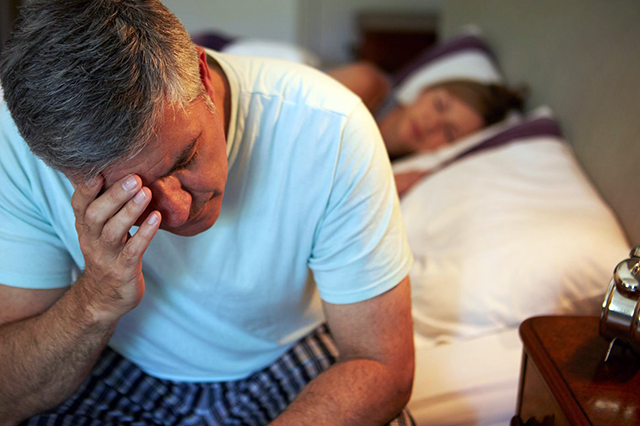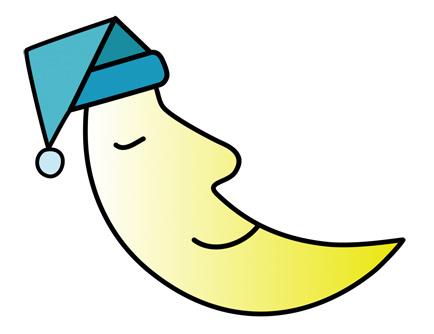You are here
How to sleep when you can’t stop thinking about coronavirus: Experts offer tips
By The Philadelphia Inquirer (TNS) - Apr 06,2020 - Last updated at Apr 06,2020

AFP photo
There’s nothing like a dark, quiet bedroom to send a stressed-out mind down a rabbit hole of worry, and the coronavirus is giving us all a new set of possible catastrophes to feast upon.
As your head hits the pillow, or maybe when you stir at 2am, you start to wonder: Does that little sore throat mean you’re doomed? What if that guy who stood too close at the grocery store had the virus? Can your father or grandfather — or you — survive this?
It goes on and on, and pretty soon you’re worried that you’ll never get to sleep, and you’ll feel horrible the next day. Plus, you need sleep for a strong immune system, so staying awake could make you sick. This kind of thinking is a recipe for insomnia.
“Six months from now, we’re going to have a much larger population of adults with insomnia, and certainly children,” said Amy Sawyer, who has a doctorate in nursing at Penn Nursing and studies health behaviours related to sleep.
Other experts were not as sure that insomnia would soon go viral but did say they’re hearing that patients, as well as friends, coworkers, and family members, are having more trouble than usual getting to sleep or staying asleep in these anxious times.
“Sleep is one of the first things that goes,” said Phil Gehrman, a psychologist at the Penn Sleep Centre. “I describe sleep as our barometer.”
We asked Sawyer, Gehrman, Michael Grandner, who directs the Sleep and Health Research Program at the University of Arizona’s College of Medicine, and Bilal Saulat, a neurologist who is medical director of sleep medicine at Tower Health Medical Group, how to fight back against the mostly irrational thoughts that pop into your head as soon at it hits the pillow. The solutions, they said, start long before bedtime.
Our schedules help set our circadian rhythms, the internal clock that helps us know when it’s time to wake and sleep.
Now that so many of us are either working at home or home without work, our schedules have gone haywire. Grandner says there’s one group that’s loving this: the natural night owls who hated getting up early to commute and take kids to school.
“They’ve removed a major stress from their morning,” he said. Many others, though, are unmoored to their normal routines. “You have people who are just playing video games all day,” Grandner said. “Their body is having a hard time knowing when to be awake and when to be sleeping.”
So, get on a schedule and try to stay on it. The wake-up time is especially important. Try not to deviate by more than an hour. Eat meals at regular times, but don’t eat big meals close to bedtime. Maintain regular morning and evening routines — showers, tooth brushing, face washing, etc. — that cue your body to wake up or sleep.
Try to get outside for at least 15 minutes, preferably in the morning. This is also important for circadian rhythms. If possible, open a curtain so you wake to sunlight.
Exercise will help relieve stress. Just don’t do it near bedtime. It raises core body temperature, while falling body temperature triggers sleep, Gehrman said. He recommends no exercise within an hour or two of bedtime.
“The bedroom is for sleep and sex, and if you’re doing anything else in it, you shouldn’t,” Sawyer said.
That means no television and no other screens. “It is never OK to use screens or TVs in your bedroom,” Saulat said.
Sleep experts might occasionally make an exception for paperbound books, but you don’t want a real page-turner at bedtime.
Also, Sawyer said, people tend to sleep better in a cooler bedroom. Set the thermostat at 68 or below.
Grandner talks about “landing the plane,” not hoping it can just drop out of the sky.
Do things that relax you in the hours leading up to bed.
Read, stretch, knit, meditate.
It pains us to say this, but the experts agreed that loading up on news about the coronavirus before bed is not a good thing. Yes, the news is changing all the time, but Grandner said there’s nothing you can do about it, and it will still be there for your consumption in the morning.
Without prompting, Saulat said he thinks there’s a lot to be said for reading a newspaper once in the morning and then going about your life.
Grandner wouldn’t go that far, but counsels unplugging well before bedtime. “The time for reading stressful news is not within an hour of going to bed,” he said.
Either turn off the blue light on your screens at night or shut devices off completely. Saulat said that turning screens off two to four hours before bedtime can make a “huge” difference in sleep.
Sawyer said many of her students are binge-watching Netflix, which is not conducive to sleep.
“The blue light that’s emitted from electronic devices is wake-setting to your brain,” she said. “It basically cues your brain that it’s wake time.” She recommends turning devices off 15 to 30 minutes before sleep.
Saulat said not to use prescription pills. Most people can fix their sleep problems by learning to change their behaviour.
Don’t drink caffeinated beverages after noon. Alcohol may help you go to sleep but it disrupts sleep afterward.
Nicotine makes it harder to go to sleep and stay asleep.
If you know your mind tends to spin at bedtime, try setting a specific time to worry earlier in the day for, say, 15 minutes. Acknowledge what you’re feeling and what you’re doing to protect yourself and your family. Take solace in knowing you’re doing everything you can, Sawyer said, and accept that you can’t control everything. Some people find it helpful to write this down.
Saulat usually adds a third category: Is it going to kill me? He concedes that’s not an ideal question now.
The black of night is not the time, the experts said, to try to talk sense to your fears. In the dark, think of yourself as an emotional 12-year-old, Grandner said. Telling yourself that the odds are minuscule that the cat’s sneeze gave you the coronavirus probably won’t stop that thought.
At night, he said, “You tend to blow things out of proportion. … You tend to be very bad at putting things in perspective. … Sometimes, we have to give ourselves permission to be irrational creatures.”
Humans seem to be primed for scary thoughts at night, Gehrman said. “No one ever tells me they lie awake in bed thinking happy thoughts,” he said. He agrees with Grandner that “it’s really difficult in the middle of the night to make yourself see reason.”
What about strange apocalyptic dreams?
Gehrman doesn’t put much stock in dream analysis but said dreams can reflect unresolved problems. “Our daytime emotions follow us into our sleep,” he said.
If you’ve spent more than 10 minutes ruminating about the end of the world, it’s time to take your brain elsewhere. You don’t want your body to associate the bed with wakefulness.
“Don’t turn your bed into a thinking couch,” Saulat said.
Get up and do something that relaxes you and takes your mind off your specific worry. The sleep experts are fans of meditation — if you’re new to this, you can find online guided imagery programs — and progressive relaxation techniques. For relaxation, start at your toes or head and slowly tighten and then relax muscles. Gradually do this until you reach the other end of the body.
Mindfulness meditation and breathing techniques can help you learn to focus on the now instead of worrying about the future.
Sawyer recommends a technique that she uses every night. Bring your focus to your breath while breathing normally. Count at the end of each exhalation until you reach 10 and then count from 10 to one. “At the end, I feel very relaxed,” she said. If you haven’t done this before, you may have to start with a smaller number of breaths.
When you feel sleepy, go back to bed.
Related Articles
Parents have long suspected it, but now doctors have proof: the more time teenagers spend on computers or mobile phones, the less they sleep — especially if the gadget is used just before bedtime.
Women are taught to take care of others before taking care of themselves.


















